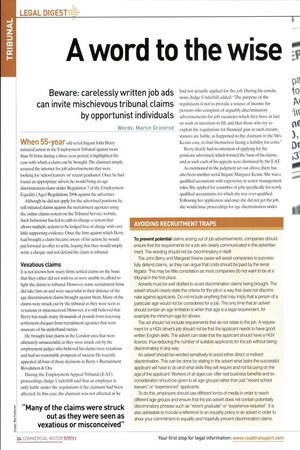A word to the wise
Page 24

Page 25

If you've noticed an error in this article please click here to report it so we can fix it.
Beware: carelessly written job ads can invite mischievous tribunal claims by opportunist individuals
Words: Martin Grindrod
When 55-year
-old serial litigant John Berry initiated action in the Employment Tribunal against more than 50 firms during a three-year period, it highlighted the ease with which a claim can be brought. The claimant simply scoured the intemet for job advertisements that were looking for 'school leavers' or 'recent graduates: Once he had found an appropriate advert, he would bring an age discrimination claim under Regulation 7 of the Employment Equality (Age) Regulations 2006 against the advertiser.
Although he did not apply for the advertised positions, he still initiated claims against the recruitment agencies using the online claims system on the Tribunal Service website. Such behaviour has led to calls to change a system that allows multiple actions to be lodged free of charge with very little supporting evidence. Once the firm against which Berry had brought a claim became aware of his action, he would put forward an offer to settle, hoping that they would simply write a cheque and not defend the claim at tribunal.
Vexatious claims
It is not known how many firms settled claims on the basis that they either did not wish to, or were unable to, afford to fight the claims to tribunal. However, some recruitment firms did take him on and were successful in their defence of the age discrimination claims brought against them. Many of the claims were struck out by the tribunal as they were seen as vexatious or misconceived. However, it is still believed that Berry has made many thousands of pounds from receiving settlement cheques from recruitment agencies that were unaware of his underhand tactics.
He brought four claims in the London area that were ultimately unsuccessful, as they were struck out by the employment judges who believed his claims were vexatious and had no reasonable prospects of success. He recently appealed all four of those decisions in Berry v Recruitment Revolution & Ors.
During the Employment Appeal Tribunal (EAT) proceedings, Judge Underhill said that an employer is only liable under the regulations if the claimant had been affected. In this case, the claimant was not affected as he had not actually applied for the job. During his conclusions, Judge Underhill added: "The purpose of the regulations is not to provide a source of income for persons who complain of arguably discriminatory advertisements for job vacancies which they have in fact no wish or intention to fill, and that those who try to exploit the regulations for financial gain in such circumstances are liable, as happened to the claimant in the Mrs Keane case, to find themselves facing a liability for costs."
Berry clearly had no intention of applying for the positions advertised, which formed the basis of his claims, and as such each of his appeals were dismissed by the EAT.
As mentioned in the judgment set out above, there has also been another serial litigant, Margaret Keane. She was a qualified accountant with experience in senior management roles. She applied for a number of jobs specifically for newly qualified accountants, for which she was over-qualified. Following her application and once she did not get the job, she would issue proceedings for age discrimination under the regulations Many of the cases settled before reaching tribunal and it has been reported that she had made more than £.100,000 from such settlements
tAt.f Legal costs
Many of the companies did defend the actions brought against them by Keane, and the Employment Tribunal dismissed these claims on the grounds that she was not a genuine applicant for the positions but simply wanted to claim compensation under the regulations. It was shown that she had deliberately applied for jobs for which she was over-qualified, with the intention of claiming compensation. As such she was ordered to pay her opponents' legal costs of defending the actions brought by her.
Both cases may help dissuade potential claimants from bringing vexatious and misconceived tribunal claims. However, anyone can bring any number of claims at no cost and with little supporting evidence. Employers are still at risk of this sort of claim if the applicant can demonstrate the criteria needed for the job. w • Martin Grindrod is a solicitor at Backhourse Jones. www.backhousejones.co.uk
Further Information
Employment Equality (Age) Regulations 2006. http:// bit.ly/f0JDxF








































































































































